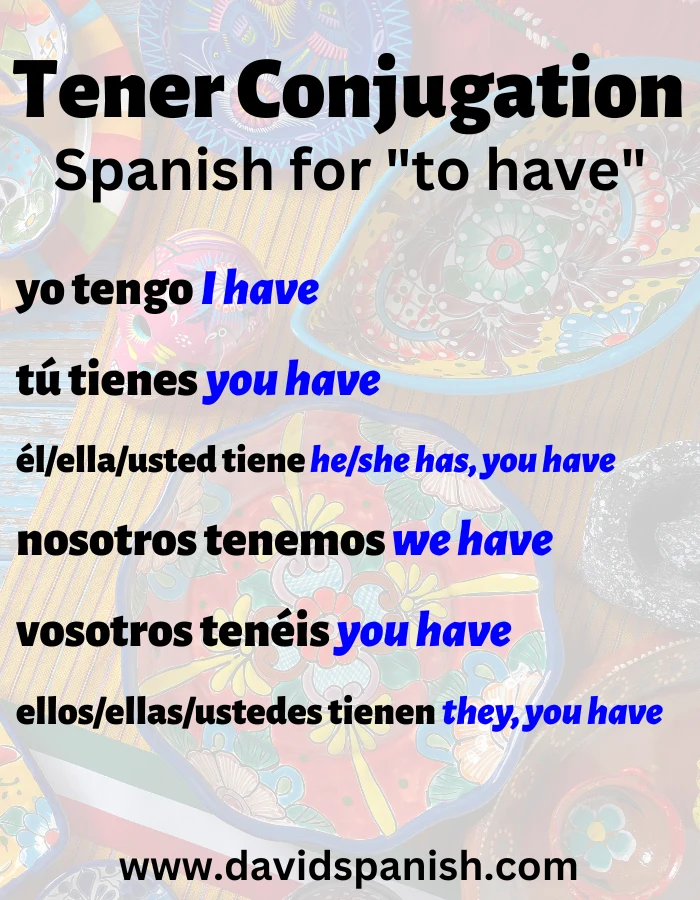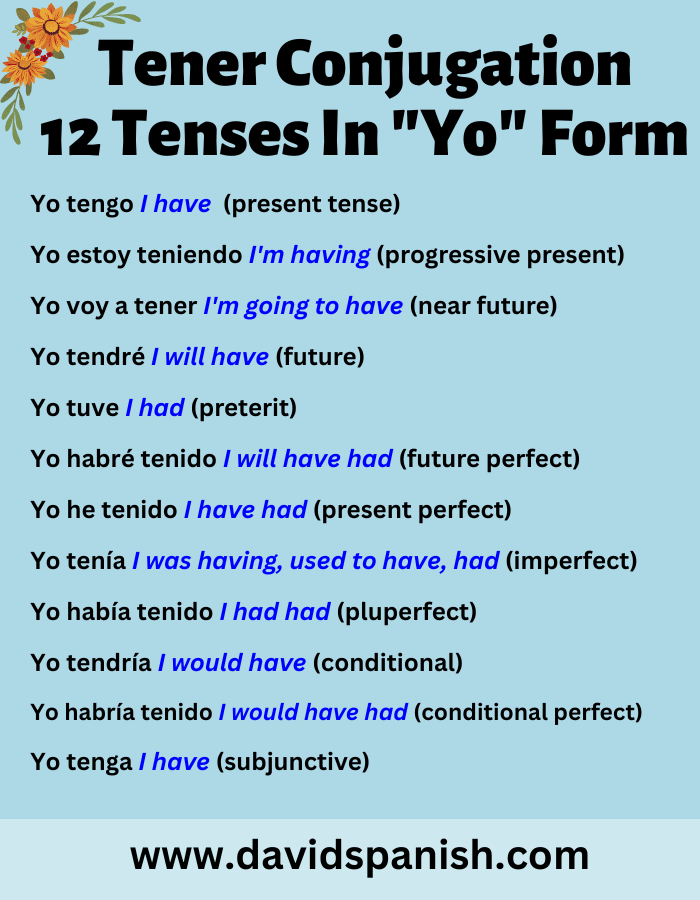Conjugation tables for tener in Spanish
The Spanish verb tener is one of the most most important verbs in the Spanish language. The meaning of tener is “to have”. The conjugation of tener in the present tense is: Yo tengo (I have), tú tienes, él/ella/usted tiene (he/she has, you have), nosotros tenemos (we have), vosotros tenéis (you have) and ellos/ellas/ustedes (they, you have). This post offers complete conjugation tables for tener with with example sentences.

Tener is an irregular ER verb. This means that it’s endings when conjugated in the present tense are different than all of the other regular ER verbs. This page on our site covers Spanish ER verbs in detail.

This page will cover how to conjugate tener in ten verb tenses which are necessary to speak Spanish fluently. We’ll also provide a list of the most common usages and several expressions containing tener.
We’ve provided conjugation charts (see below) with the following nine tenses:
- Present tense (presente de indicativo)
- Progressive present (presente progresivo)
- Near future (futuro inmediato)
- Future tense (futuro)
- Preterite (pretérito)
- Present perfect indicative (perfecto de indicativo)
- Imperfect (imperfecto de indicativo)
- Conditional (potential simple)
- Present subjunctive (presente de subjuntivo)
Tener conjugation table

Tener usage: Idioms with tener
Tener is a very versatile verb and has many usages.
1. Possession
The first usage of tener is possession. Simply put, tener equates to “to have” in English. For example:
- Yo tengo un perro. I have a dog.
- Tú tienes un gato. You have a cat.
- Ella tiene una pregunta. She has a question.
- Tenemos una casa en México. We have a house in Mexico.
2. Age
Tener is also used to express age, or “years-old”. The grammatical construction is: Tener + number + años. For example:
- ¿Cuanto años tienes? How old are you (literally how many years do you have)?
- Yo tengo veinticinco años. I’m 25 years-old.
- Mi abuelo tiene setenta anos. My grandfather is 70 years-old.
3. Tener que + infinitive
The construction tener que + infinitive means “to have to” or “must”.
- Tengo que comprar un nuevo coche. I have to buy a new car.
- Tengo que irme. I have to go.
- Usted tiene que aprender español. You need to learn Spanish.
- ¡Tienes que estudiar los verbos! You need to study the verbs!
4. Expressing feelings
Tener is also associated with expressions of feelings and “states” of being.
- Yo tengo sueno. I’m tired.
- Nosotros tenemos miedo. We’re scared
- Martín tiene celos. Martin is jealous.
- María tiene rabia. María is annoyed.
5. Hungry and thirsty
Tener is used to express being hungry and thirsty.
- Nosotros tenemos habre. We’re hungry.
- ¿Tiene usted sed? Are you thirsty?
6. Hot and cold
Expressions for being hot and cold also use tener.
- Pablo tiene frío. Pablo is cold.
- Julia tiene calor. Julia is hot.
7. To be right
The expression for “to be right” is tener razón.
- Usted tiene razón. You are right.

Tener conjugation charts.
Present tense (presente de indicativo)
In the present tense, yo tengo translates to “I have” as well as “I am having”.
| yo tengo | I have | Yo tengo una casa grande. | I have a big house. |
| tú tienes | you have | Tú tienes un coche nuevo. | You have a new car. |
| él/ella, usted tiene | he/she has, you have | Ella tiene un novio. | She has a boyfriend. |
| nosotros tenemos | we have | Nosotros tenemos dos gatos. | We have two cats. |
| vosotros tenéis | you have | Vosotros tenéis un chalé en Francia. | You have a villa in France. |
| ellos/ellas, ustedes tienen | they, you have | Ellos tienen un negocio muy rentable. | They have a very profitable business. |
Progressive present (presente progresivo)
In Spanish, the progressive present combines the present form of estar (to be) with the present participle. Yo estoy teniendo translates to “I am having”.
| yo estoy teniendo | I am having | Yo estoy teniendo problemas con mi jefe. | I'm having problems with my boss. |
| tú estás teniendo | you are having | Tú estás teniendo recuerdos. | You are having memories. |
| él/ella, usted está teniendo | he/she is having, you are having | Él está teniendo un día mejor. | He is having a better day. |
| nosotros estamos teniendo | we are having | Nosotros estamos teniendo dificultades para perder peso. | We're having a hard time losing weight. |
| vosotros estáis teniendo | you have having | Vosotros estáis teniendo algunas problemas. | You are having some problems. |
| ellos/ellas, ustedes están teniendo | you, they have having | Ellos estan teniendo mucho éxito. | They are having a lot of success. |
Near future (futuro inmediato)
In Spanish, the near future tense equates to “going to” in English and is formed by combining ir (to go) in the present tense with the preposition a and an infinitive. For example, yo voy a tener means “I’m going to have”.
| yo voy a tener | I'm going to have | Yo voy a tener muchísimo éxito. | I'm going to have a lot of success. |
| tú vas a tener | you're going to have | Vas a tener una experiencia maravillosa. | You're going to have a wonderful experience. |
| él/ella, usted va a tener | he/she's going to have, you're going to have | Él va a tener un hijo. | He's going to have a son. |
| nosotros vamos a tener | we're doing to have | Nosotros vamos a tener hambre. | We're going to be hungry. |
| vosotros vais a tener | you're going to have | Vosotros vais a tener frío. | You're going to be cold. |
| ellos/ellas, ustedes van a tener | they're / you're going to have | Ellos van a tener que tomar una decisión. | They're going to have to make a decision. |
Future tense (futuro)
In the Spanish future tense, yo tendré translates to “I will have”.
| yo tendré | I will have | Yo tendré que comprar un coche nuevo. | I'll have to buy a new car. |
| tú tendras | you will have | Tú tendras que vender la casa. | You'll have to sell the house. |
| él/ella, usted tendra | he, she, you will have | Ella tendra que aprendre fancés. | She'll have to learn French. |
| nosotros tendremos | we will have | Nosotros tendremos que salir mañana. | We'll have to leave tomorrow. |
| vosotros tendréis | you will have | Vosotros tendréis que hacer caso. | You'll have to pay attention. |
| ellos/ellas, ustedes tendrán | they will have | Ellos tendrán dos opciónes. | They will have two options. |
Preterite (pretérito)
In Spanish, the preterite is used to describe past actions which occurred at specified times. Yo tuve translates to “I had”.
| yo tuve | I had | Yo tuve un buen viaje. | I had a good trip. |
| tú tuviste | you had | Tú tuviste muchísima suerte en España. | You had a lot of luck in Spain. |
| él/ella, usted tuvo | he, she, you had | Ella tuvo algunas buenas ideas. | She had a few good ideas. |
| nosotros tuvimos | we had | Nosotros tuvimos una buena oportunidad. | We had a good opportunity. |
| vosotros tuvisteis | you had | Vosotros tuvisteis que enunciar a vuestro trabajo. | You had to quit your job. |
| ellos/ellas, ustedes tuvieron | they, you had | Ellos tuvieron que quedarse en Argentina. | They had to stay in Argentina. |
Present perfect indicative (perfecto de indicativo)
In Spanish, the present perfect indicative tense is used to express past actions which occurred at unspecified times and may have an an ongoing impact on the present.
The tense is formed by combining the present tense of haber (to have) with the past participle. Yo he tenido translates to “I have had”.
| yo he tenido | I had | Yo he tenido mucho trabajo. | I have had a lot of work. |
| tú has tenido | you had | Tú has tenido mucha suerte. | You've had a lot of luck. |
| él/ella, usted ha tenido | he, she, you had | Ella ha tenido la misma experiencia. | She had the same experience. |
| nosotros hemos tenido | we had | Nosotros hemos tenido un buen día. | We've had a good day. |
| vosotros habéis tenido | you had | Vosotros habéis tenido que hacer ejercicios. | You've had to exercise. |
| ellos/ellos, ustedes han tenido | they, you had | Ellos han tenido que contratar a un empleo. | They've had to hire an employee. |
Imperfect (imperfecto de indicativo)
In Spanish, the imperfect is used to describe past actions which used to happen regularly and unspecified times.
| yo tenía | I used to have, was having, had | Cuando era nino, teníaun gato. | I used to have a cat when I was little. |
| tú tenías | you used to have, were having, had | ¿Qué coche tenías? | What car did you used to have. |
| él/ella, usted tenía | He/she used to have, was having had / You (same as above) | Él tenía un casa en España. | He used to have a house in Spain. |
| nosotros teníamos | We used to have, were having, had | Nosotros teníamos dos perros. | We used to have two dogs. |
| vosotros teníais | you used to have, were having, had | Vosotros teníais un coche deportivo. | You used to have a sports car. |
| ellos/ellas, ustedes tenían | they used to have, were having, had | Ellos tenían un departamento en una estación de esquí. | They used to have a condo in a ski resort. |
Conditional (potential simple)
In Spanish, the conditional is used for potential or “would” situations. Yo tendría transaltes to “I would have”.
| yo tendría | I would have | Yo tendría un perro si tuviera una casa. | I'd have a dog if I had a house. |
| tú tendrías | you would have | Tú tendrías más si fueras más amable. | You'd have more friends if you were nicer. |
| él/ella, usted tendría | he, she, you would have | Ella tendría un gato si no fuera alérgica. | She's have a cat if she wasn't allergic. |
| nosotros tendríamos | we would have | Nosotros tendríamos más dinero si ahorráramos. | We'd have more money if we saved. |
| vosotros tendríais | you would have | Vosotros tendríais más tiempo libre si trabajarais menos. | You'd have more free time if you worked less. |
| ellos/ellas, ustedes tendrían | they, you would have | Ellos tendrían dos coches si no vivieran en la ciudad. | They'd have two cars if they didn't live in the city. |
Present subjunctive (presente de subjuntivo)
In Spanish, the present subjunctive is used to express wishes, emotions and doubts.
| yo tenga | I have | Es important que tenga buenas relación con los vecinos. | It's important that I have good relations with the neighbors. |
| tú tengas | you have | Espero que tengas tu proprio coche. | I hope you have your own car. |
| él/ella, usted tenga | he/she has, you have | No sé si él tenga el día libre. | I don't know if he has the day off. |
| nosotros tengamos | we have | Es importante que tengamos paciencia. | It's important that we have patience. |
| vosotros tengáis | you have | Es necesario que tengáis pasaporte. | It's necessary that you have passports. |
| ellos/ellas, ustedes tengan | they, you have | Es posible que tengan un compromiso. | It's possible that they have a conflict. |
Discover more:
- Hablar (to speak) conjugation tables
- Ser vs estar explained
- Spanish AR verbs
- Spanish IR verbs
- Spanish ER verbs
- La Bamba Meaning, Spanish Lyrics & English Translation - May 4, 2024
- Bésame Mucho Meaning, Spanish Lyrics & English Translation - May 3, 2024
- Querida – Lyrics, Meaning & Translation - May 2, 2024
